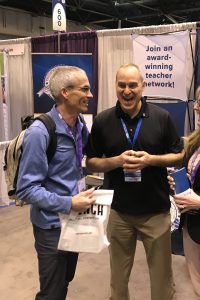 James Brown, a 5th and 6th grade STEM teacher at Sand Creek Middle School, made several presentations at the 67 Annual National Conference on Science Education held in St. Louis. He also attended numerous professional development opportunities, viewed the latest science materials and programs in the exhibit hall, and listened to lectures from researchers in the field.
James Brown, a 5th and 6th grade STEM teacher at Sand Creek Middle School, made several presentations at the 67 Annual National Conference on Science Education held in St. Louis. He also attended numerous professional development opportunities, viewed the latest science materials and programs in the exhibit hall, and listened to lectures from researchers in the field.
Brown’s presentations focused on Problem Based Learning, Using Science Magazines to Connect ELA and the Next Generation Science Standards, Coding, and STEM education.
About the Conference
The NSTA 67th National Conference on Science Education conference was held April 11-14. These sessions focus on our four conference strands (Three-Dimensional Grand Slam, Phenomena: Gateway to Learning, Jazzing Up Science with Cross-Curricular Connections, and Confluence of Equity and Education) as well as life science; Earth and space science; physical science; engineering, technology, and the application of science; informal science education, and general science education. Sessions also cover grades Pre K–college.
Educators who attended were treated to informative sessions on important topics. This grand event is always a MUST consider for the highlight of professional development, attracting science educators from across the U.S. and around the world. The keynote speaker was Scott Kelly, retired astronaut and retired U.S. Navy captain.
More than 1,000 sessions, including case studies, hands-on workshops, presentations, award and grant programs, and exhibitor workshops covering all subjects and grade bands were offered to fill any participant’s daily schedule. All of this was offered in the following four strands:
Three-Dimensional Grand Slam, Phenomena: Gateway to Learning, Jazzing Up Science with Cross-Curricular Connections, and Confluence of Equity and Education.
About NSTA
The National Science Teachers Association (NSTA), founded in 1944 and headquartered in Arlington, Virginia, is the largest organization in the world committed to promoting excellence and innovation in science teaching and learning for all. NSTA’s current membership of 50,000 includes science teachers, science supervisors, administrators, scientists, business and industry representatives, and others involved in and committed to science education.
